During the COVID-19 pandemic, the walk-in Pro Bono Clinics have been suspended until further notice. However, our Pro Bono Clinic remains in operation, in a remote capacity. See the flyer below for details.
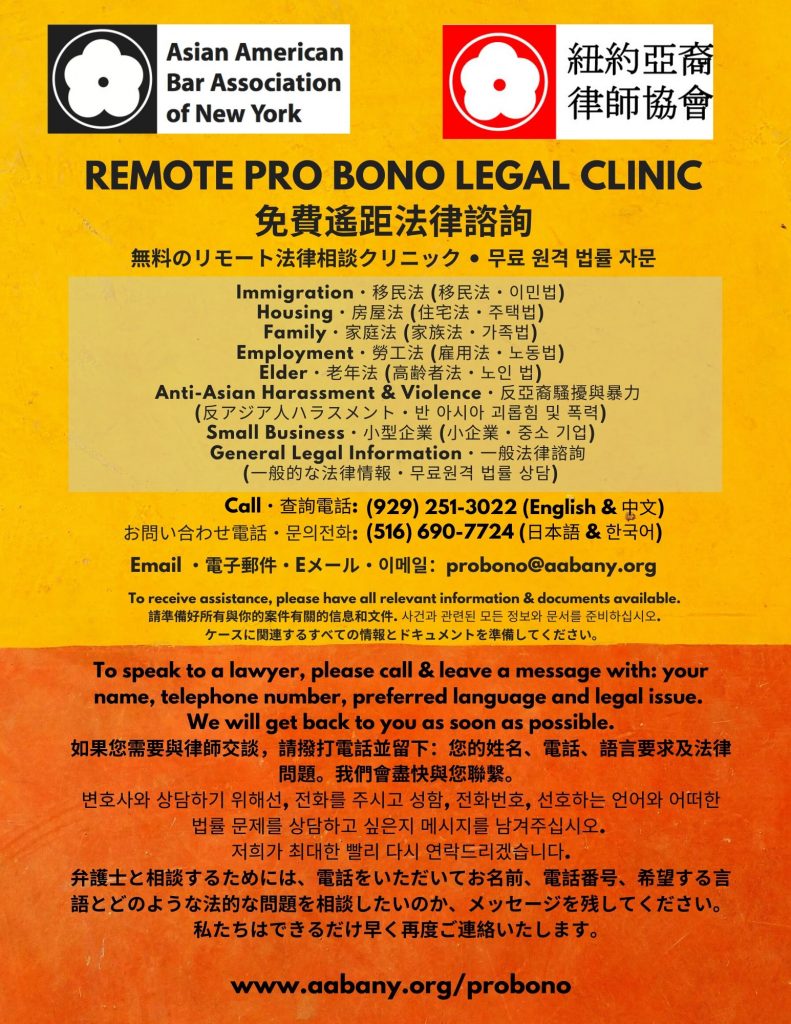
During the COVID-19 pandemic, the walk-in Pro Bono Clinics have been suspended until further notice. However, our Pro Bono Clinic remains in operation, in a remote capacity. See the flyer below for details.

The Criminal Justice Act/Pro Bono Committee is accepting applications for the Second Circuit’s Pro Bono Panel. The deadline to be considered for appointment in 2020 is April 30, 2020.
Pro Bono Panel members will, at the Court’s invitation or on a litigant’s motion for appointment of counsel, represent pro se litigants in civil appeals that present issues of first impression, complex issues of law or fact, or potentially meritorious claims warranting further briefing and oral argument. Pro bono representation will be provided to litigants who would otherwise be unable to pay for counsel and are ineligible for the appointment of counsel pursuant to the Criminal Justice Act.
Cases in which pro bono counsel will be appointed cover a broad range of legal issues, including prisoner civil rights, labor and employment, discrimination, social security, immigration, and tax law.
Applicants must be admitted to and members in good standing of the Bar of the Second Circuit or have an admission application pending before this Court, and have at least three years of appellate litigation experience. Pro Bono Panel members will serve for a three-year term.
Pro Bono Panel members who were appointed by the Court in 2017 for a three-year term must submit a new application if they wish to remain on the Panel.
An application package must contain a resume, a written application (available on the Court’s website at http://www.ca2.uscourts.gov) and three writing samples, preferably appellate briefs on which the applicant was the primary author. These materials must be submitted to David Bober, Director of Legal Affairs, United States Court of Appeals for the Second Circuit, 40 Foley Square, New York, NY 10007, by April 30, 2020.
The Plan for the Appointment of Pro Bono Counsel and the application form are available click here.
On Friday, January 17, 2020, thirty AABANY members and friends braved the cold weather to enjoy a mixer at Citifield for the Hello Panda Lantern Festival.

Members were able to walk around the beautifully crafted structures, lit in colorful lights against the black night sky. Members also took a break from the cold and warmed up with hot cocoa and food while networking.




We thank AABANY’s Government Service & Public Interest, Pro Bono and Community Service, Young Lawyers, and Membership Committees for co-sponsoring this event.
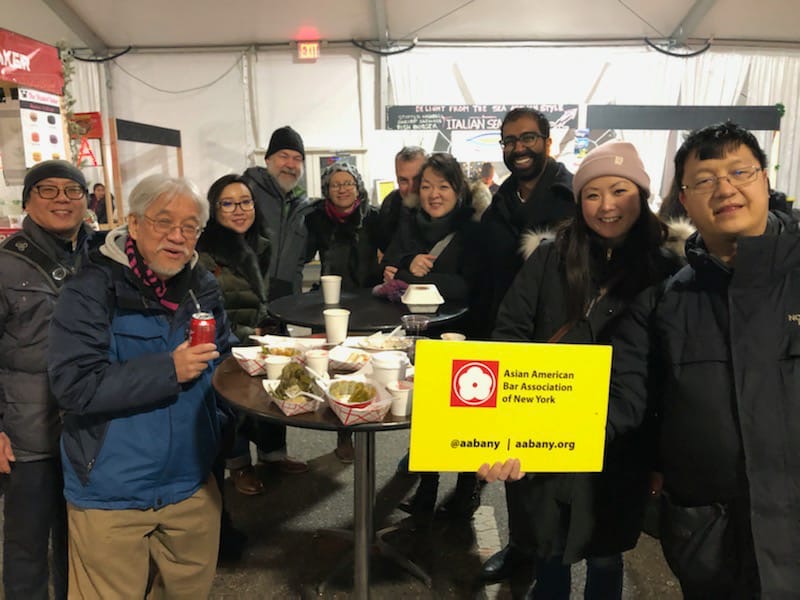
To find out more about the Government Service & Public Interest Committee go to https://www.aabany.org/page/113. To find out more about the Pro Bono & Community Service Committee go to https://www.aabany.org/page/117. To find out more about the Young Lawyers Committee go to https://www.aabany.org/page/123.
To find out more about the Membership Committee go to https://www.aabany.org/page/130.
Happy Thanksgiving!
GivingTuesday is being held this year on December 3. It is a global movement that began in 2012, and the idea behind it is simple: Do good and help transform your community with your generosity. During this holiday season, we ask that you support our Pro Bono Legal Advice and Referral Clinic, a project of the Asian American Bar Association of New York (AABANY) and the Asian American Law Fund of New York (AALFNY).
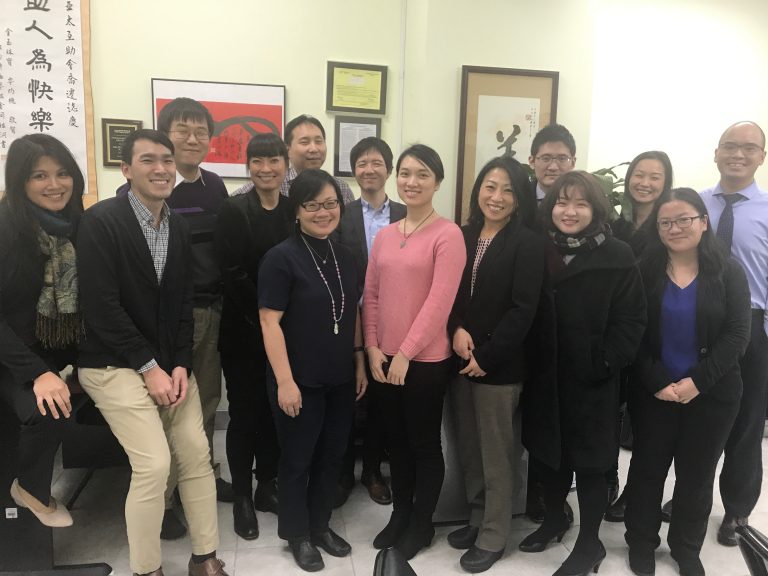
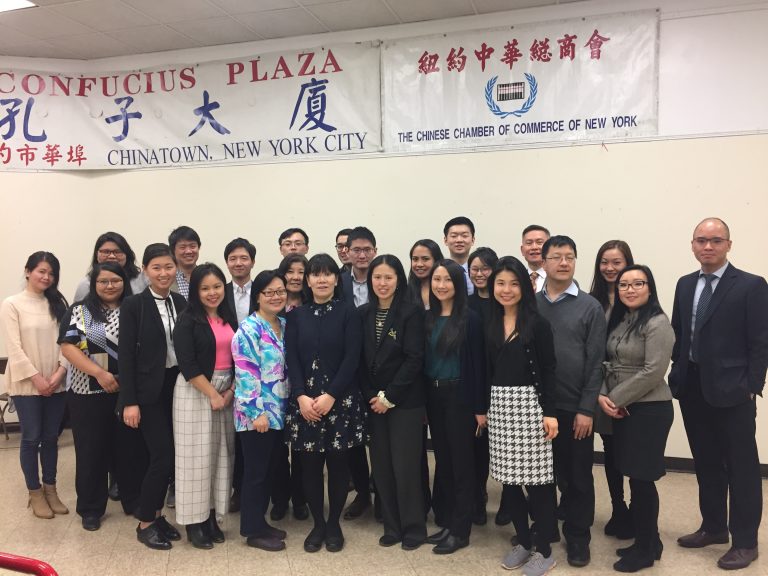
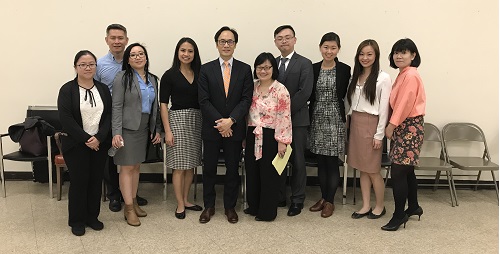
The Pro Bono Clinic began in December 2015 and has since served thousands of low-income clients facing various legal hardships. The Clinic has been held in Manhattan’s Chinatown on the second Wednesday of each month since that time. The success of our Clinics in Manhattan has led to an expansion into Brooklyn, which started this fall on a bimonthly basis. We work with local elected officials and community organizations to reach Brooklyn’s Asian American community and draw upon the expertise and language skills of AABANY’s active and diverse membership to serve them. Clients have been coming not only from the five boroughs but from as far as Yonkers, Long Island, New Jersey, and Connecticut.
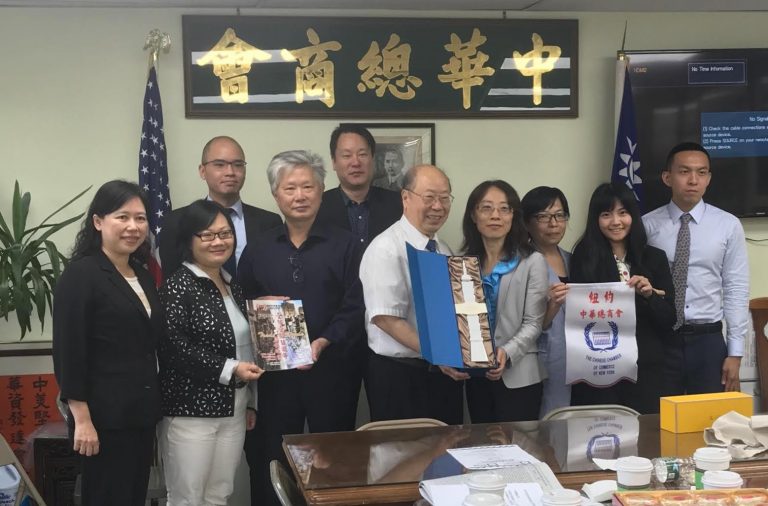
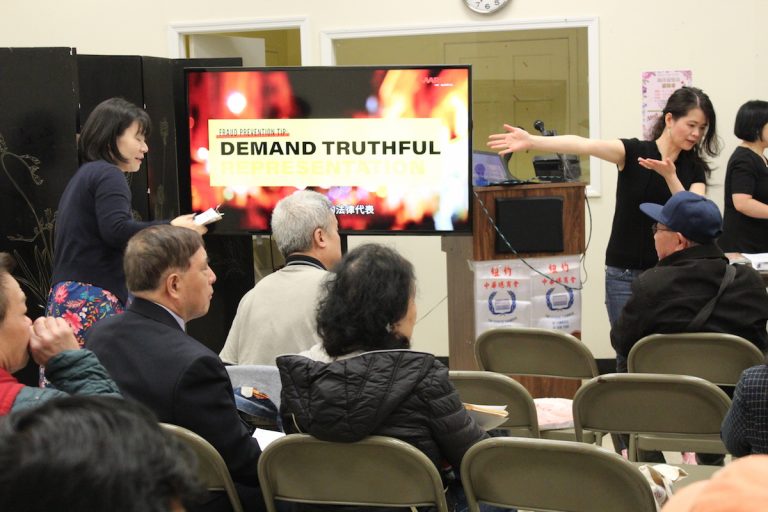
Our Clinics provide high-quality legal services that are culturally sensitive and linguistically competent. Language and culture pose serious barriers for low-income Asian American community members to receive reliable legal advice. Our Clinics help community members overcome these barriers and seek to widen their access to justice. The Clinics now include mental health professionals and benefits counselors to help community members with their non-legal problems.
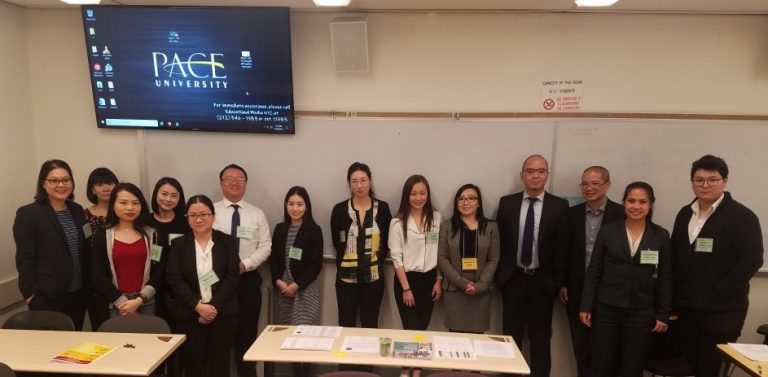
Hundreds of volunteers have dedicated thousands of hours for the Pro Bono Clinics. Month after month, they freely donate their time, expertise and legal knowledge to help community members who otherwise would not get the help they need.
Our Pro Bono Clinics can only continue to operate with the generosity of our donors. In September, we announced our goal to raise $25,000 to support the Clinic’s growing operations. We ask that you stand with us and support this vital project. Help us not only to reach our goal of raising $25,000 — through your donations on GivingTuesday – but exceed it! Your donations will support our ongoing expansion efforts and pay for much needed administrative support and supplies.
To make it easier for our members and our community to donate to the Pro Bono Clinic, you can text APAPROBONO to 44321 on your phone. That will send you to our Give Lively page, and you can follow the simple instructions there to make your contribution. You can also donate via the AALFNY website at https://www.asianamericanlawfund.org/donate/ (make sure to indicate that you are donating to the Clinic). Any amount, large or small, will go a long way towards helping us meet our $25,000 goal.
With our best wishes to you all during this holiday season,
Karen Kithan Yau
Pauline Yeung-Ha
Judy Ming Chu Lee
Asako Aiba
Co-Chairs, AABANY Pro Bono and Community Service Committee
A copy of AALFNY’s latest annual report may be obtained from AALFNY at [email protected] or from the NY Attorney General’s Charities Bureau website www.charitiesnys.com. Information may also be obtained from the NYS Attorney General at 212-416-8686.
We congratulate Karen King, AABANY Member and Counsel at Paul, Weiss, Rifkind, Wharton & Garrison LLP, on being presented NAPABA’s Pro Bono Award during the Gala at the NAPABA Convention in Austin, Texas on Saturday, November 9, 2019.
This award recognizes an attorney for outstanding achievement in Pro Bono service that involves impact litigation to advance or protect civil rights and provides direct legal services to individuals in furtherance of the administration of justice.
One of the pro bono cases that Karen was recognized for lasted for over 10 years and involved bias and discrimination in the promotion practices of the New York and New Jersey Port Authority against Asian American Police Officers. Karen found her work on the case to be very important for Asian Americans and rewarding for herself. In her video accepting the award, Karen remarked that young lawyers need to look for and seize opportunities to advance their careers “… and pro bono is an excellent way to do that.”
We are extremely excited and pleased that Karen received this prestigious honor. Please join us in congratulating her.
We commend Paul, Weiss on emphasizing, supporting, and encouraging their lawyers to engage in Pro Bono work and for being a Gold Sponsor.
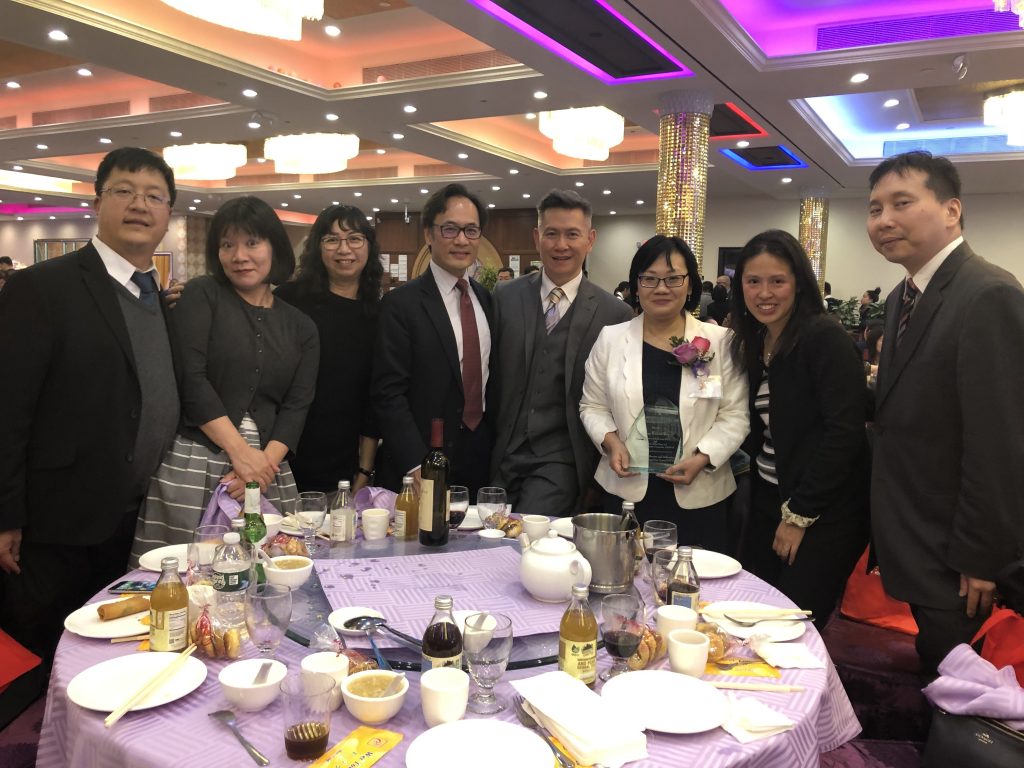
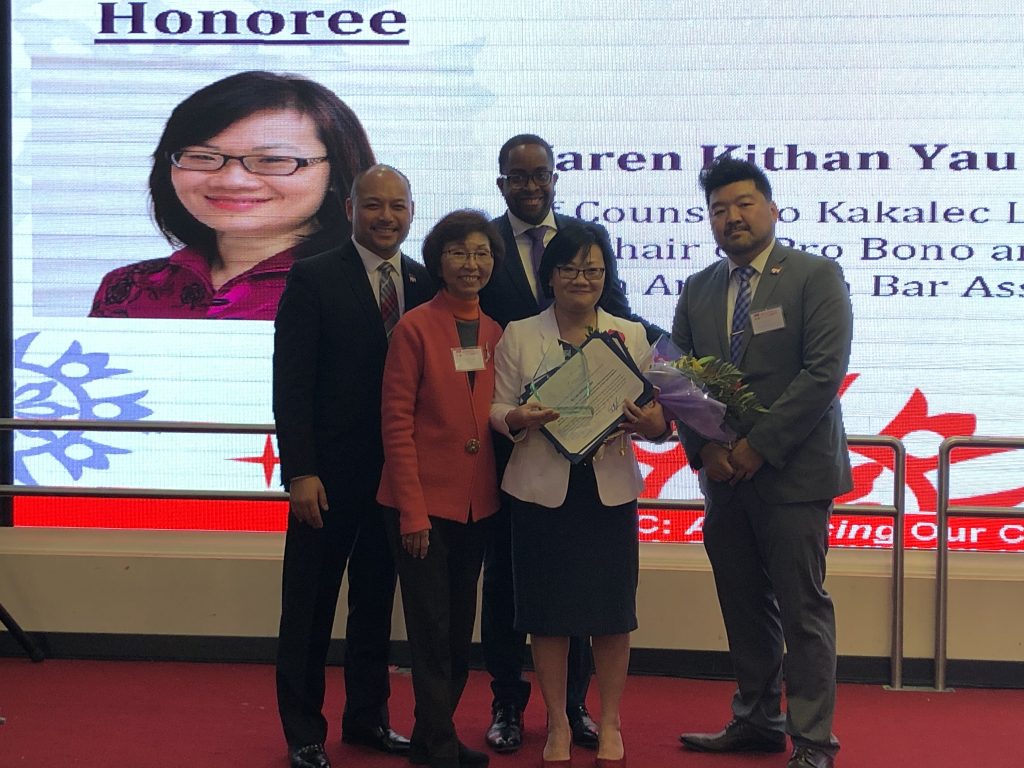
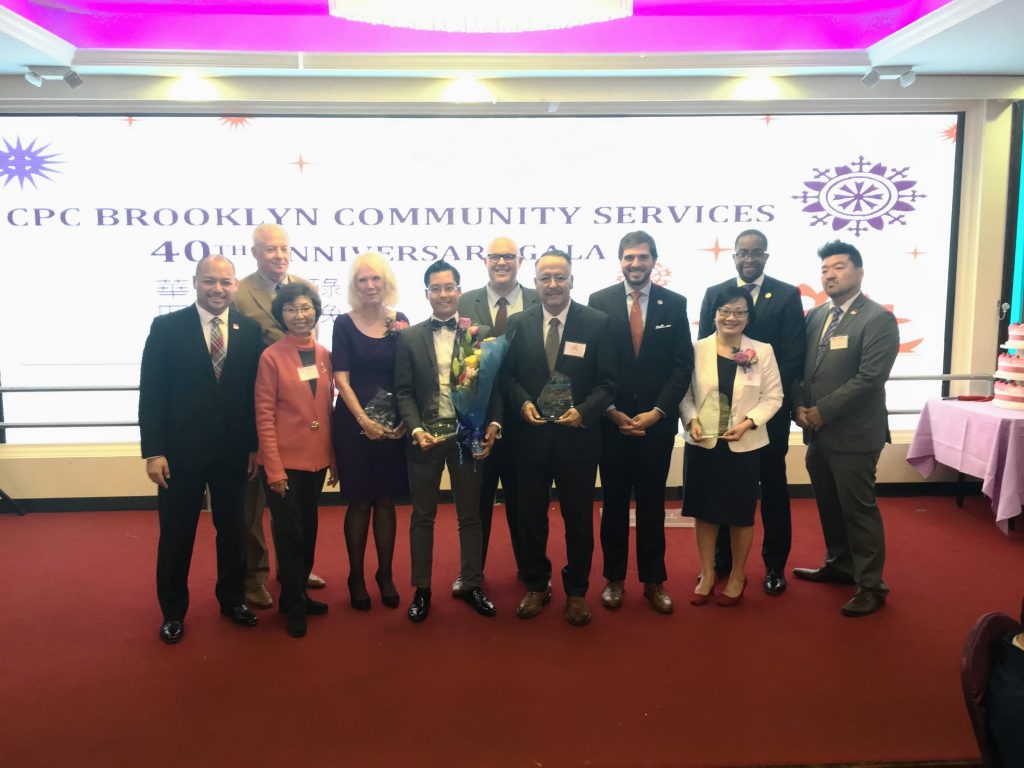
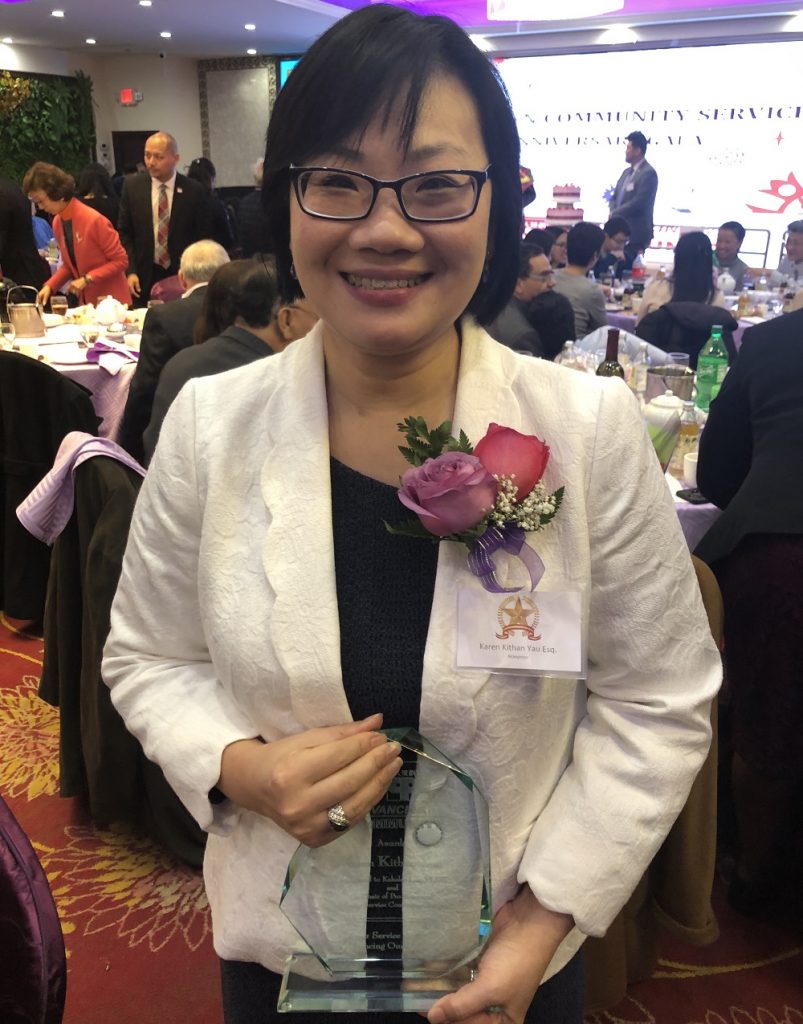
On Thursday, Oct. 17, at the 40th anniversary gala for Chinese-American Planning Council (CPC) Brooklyn Community Services, held at Affable Eatery in Brooklyn, Pro Bono Committee Co-Chair Karen Yau was honored for her work in support of the community. Many AABANY members and leaders came out to celebrate with Karen, including Pro Bono Committee Co-Chairs Pauline Yeung-Ha and Asako Aiba, Government Service and Public Interest Committee Co-Chair Kevin Hsi, AABANY Director of Technology and Professional Development Committee Co-Chair Francis Chin and Executive Director Yang Chen. Karen’s family, including her parents, were also in attendance.
AABANY also congratulates the other honorees at the gala dinner:
Karen, in her acceptance speech, accepted the award on behalf of the Pro Bono Clinic, which has grown in number of clients served and number of volunteers participating, and which started serving clients in Brooklyn last month, in September. The next Brooklyn Pro Bono Clinic will take place on November 21. Please help us spread the word. More details here: https://www.aabany.org/events/event_details.asp?legacy=1&id=1291193 If you are able to volunteer there, contact Asako Aiba at [email protected].
On March 28, the Government Service and Public Interest (GSPI) and Pro Bono Committees enjoyed some traditional Chinese delicacies at Bite of Hong Kong in Chinatown. The committees gathered for a joint year-end celebration to thank and recognize members and volunteers that made the Pro Bono Clinics, trainings, panels, and other activities a success this past year.
Thank you to everyone who attended the dinner. Thanks also to our Committee Chairs for their leadership: Kevin Hsi, Beatrice Leong and Jonathan Hernandez (GSPI); and Karen Yau, Pauline Yeung-Ha, Judy Lee and Asako Aiba. To learn more about the Pro Bono Clinic and get involved, click here. To learn more about the GSPI Committee, go here. To learn more about the Pro Bono Committee, go here.
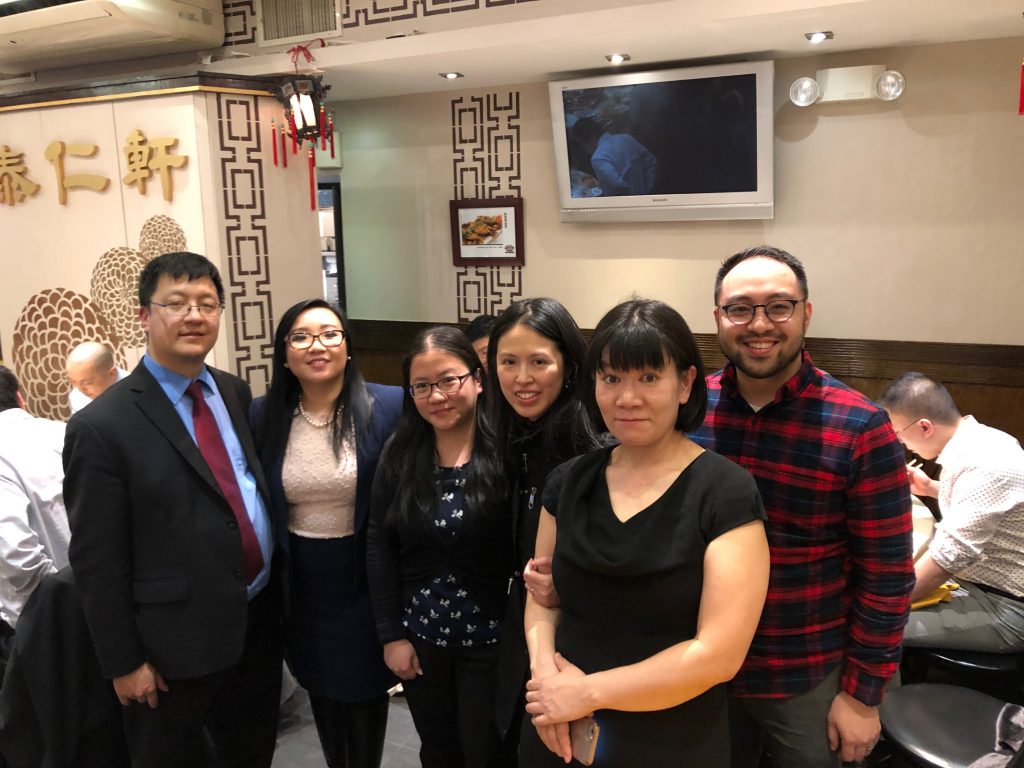
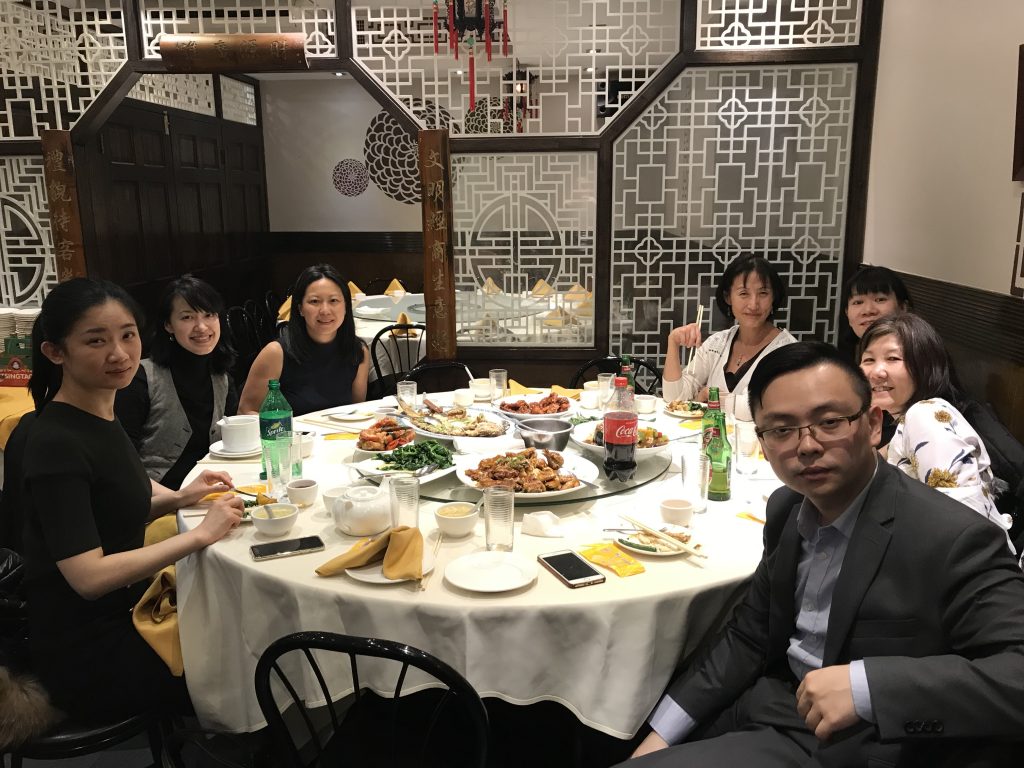
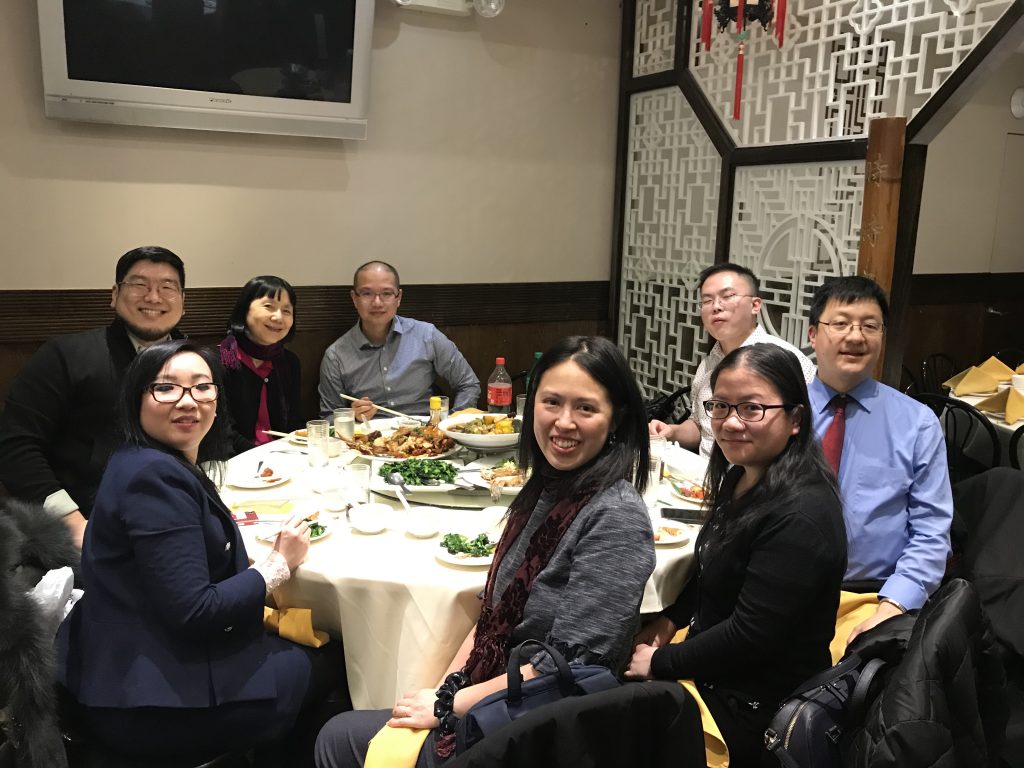
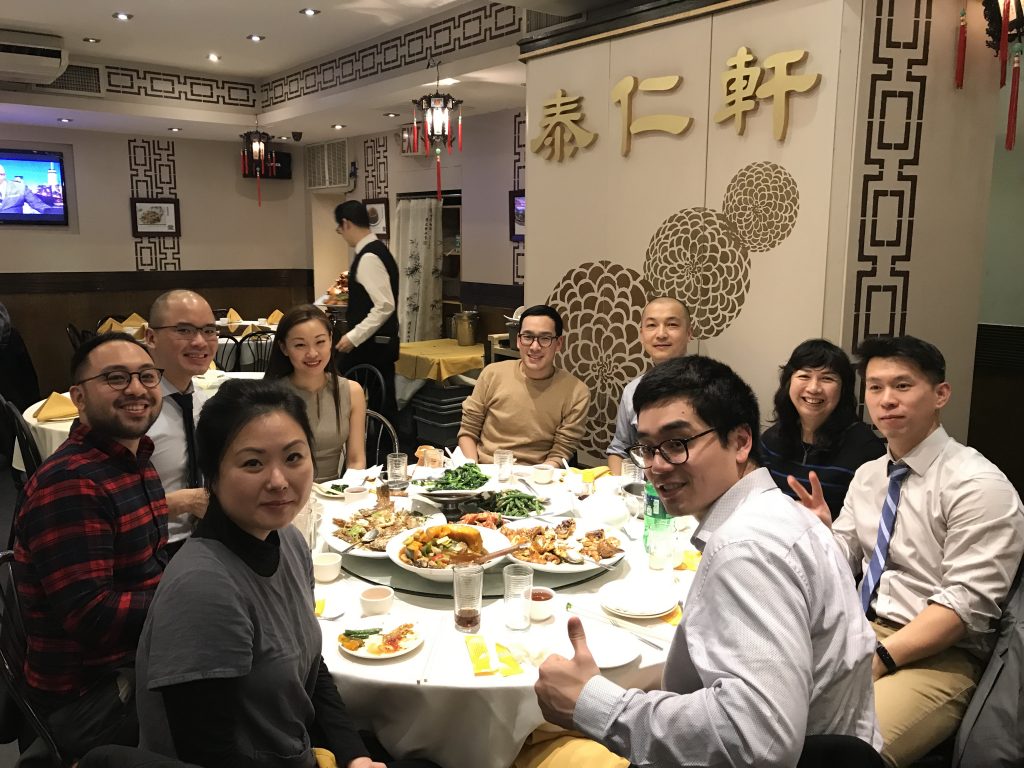
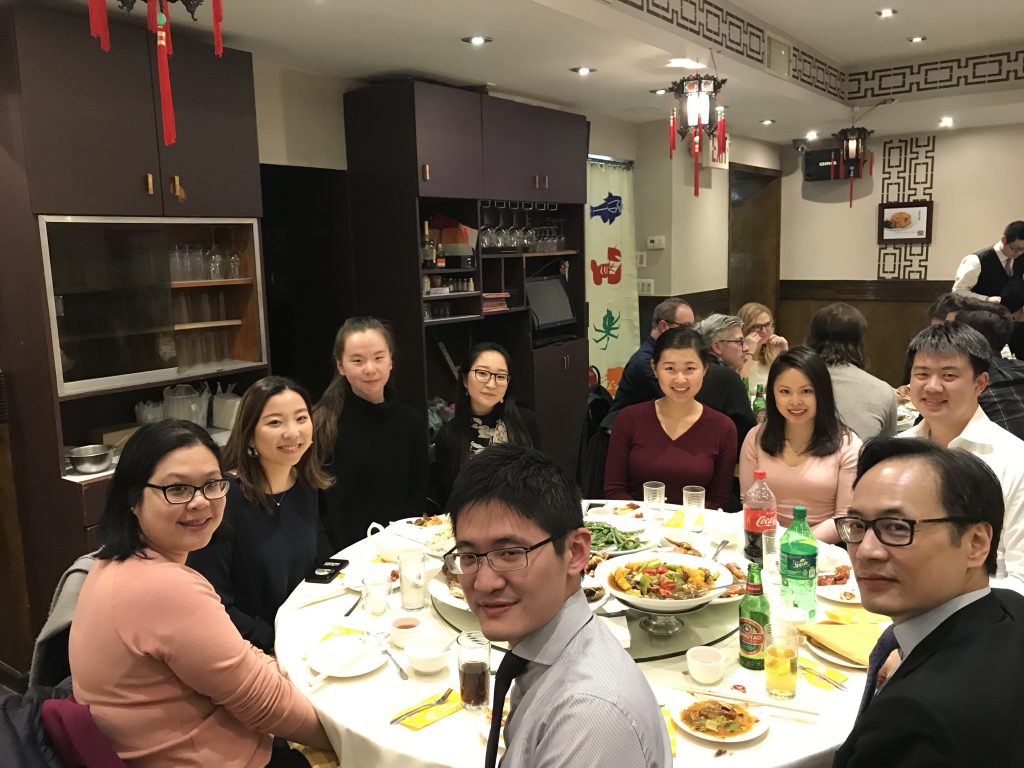
The United States Court of Appeals for the Second Circuit is accepting applications for the Court’s Pro Bono Appellate Mediator Panel. The Pro Bono Appellate Mediator Panel is authorized by Local Rule 33.1, and is governed by the Second Circuit’s Pro Bono Appellate Mediator Panel Plan. Members of the Pro Bono Appellate Mediator Panel serve as volunteer mediators for counseled, civil appeals.
All applicants must be attorneys admitted to, and in good standing with, the Bar of the Second Circuit or the bar of a state within the Second Circuit. Applicants must have 10 years of legal experience and substantial mediation experience.
As explained in the Pro Bono Appellate Mediator Plan, the Panel’s size is limited; therefore, the Court cannot appoint every qualified applicant. Membership will be on a three-year rotational basis, subject to a limit of two consecutive terms.
To apply, please submit a cover letter, resume, and this application to the Director of the Office of Legal Affairs and the Chief Circuit Mediator via email to [email protected]. Applications must be received by May 1, 2019. Please use the subject line: Appellate Mediator Panel.
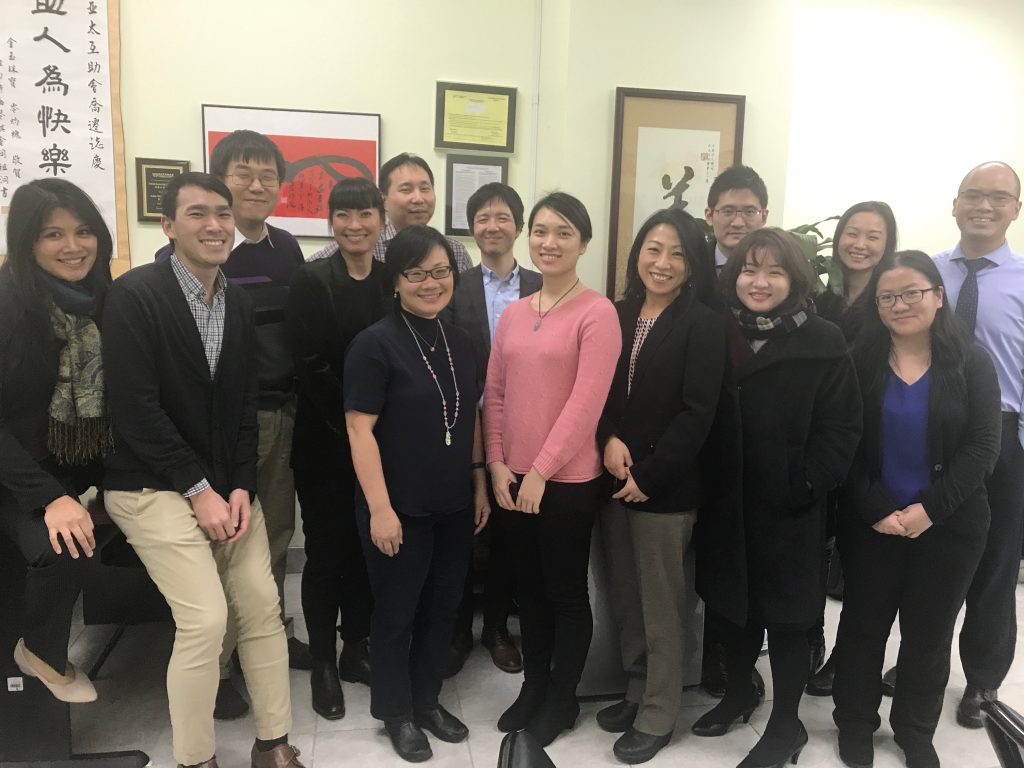
January’s Monthly Pro Bono Clinic, held on Wednesday, January 9 at 3 Bowery Street in Confucius Plaza, brought out 16 lawyers and 6 interpreters who volunteered their time to help 34 clients.
We
If you know family members, friends, or businesses, such as your firm, who would like to support the Clinic, please help us connect with them by contacting Karen Yau at [email protected].
Or please urge them to make a donation directly. They can visit the website of Asian American Law Fund of New York (AALFNY), AABANY’s 501(c)(3) affiliate: https://www.asianamericanlawfund.org/donate/ AALFNY is accepting charitable donations on the Clinic’s behalf and can issue any donor a tax receipt. Any contribution, large or small, would help. Please be sure to indicate in the memo field that the donation is intended for the Pro Bono Clinic.
Thank you to all of the January Pro Bono Clinic Volunteers!
Lawyers:
Interpreters:
Special thanks to Johnny Thach for coordinating the clinic, and the Pro Bono and Community Service Committee Co-Chairs Karen Kithan Yau, Ming Chu Lee, and Asako Aiba for their leadership.
If you are interested in volunteering at next month’s Pro Bono Clinic on February 13, please contact Asako Aiba at [email protected]. AABANY’s Monthly Pro Bono Clinic occurs every second Wednesday from 6:30 to 8:30 PM.
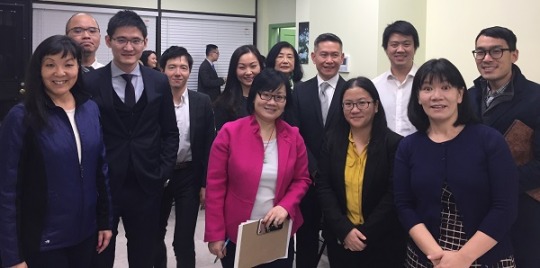
November’s Monthly Pro Bono Clinic, held on Wednesday, November 14 at 3 Bowery Street in Confucius Plaza, brought out 13 lawyers and 9 interpreters who volunteered their time to help 29 clients:
Lawyers:
Interpreters:
Special thanks to Johnny Thach and Roger Chen for coordinating the clinic, Social Worker Ann Hsu, and the Pro Bono and Community Service Committee Co-Chairs Karen Kithan Yau, Ming Chu Lee, and Asako Aiba for their leadership.
If you are interested in volunteering at next month’s Pro Bono Clinic on December 12, please contact Asako Aiba at [email protected]. AABANY’s Monthly Pro Bono Clinic occurs every second Wednesday from 6:30 to 8:30 PM.